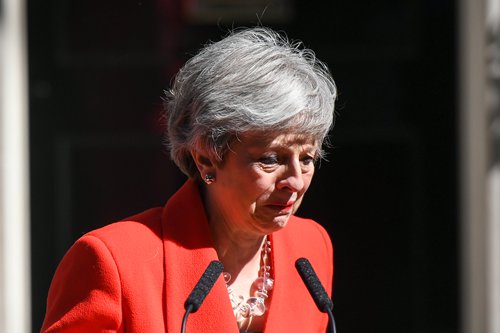HOME >> OPINION
UK political rifts to continue after May leaves
By He Zhigao Source:Global Times Published: 2019/5/27 20:05:59

Photo: VCG
Brexit has been going on for more than 30 months. Having experienced the Brexit referendum, Theresa May taking over as British prime minister, conflicts between the Conservative and Labourites, the internal Tory dissent, etc., Brexit ushered a new twist - with May's withdrawal deal dead in the water, she had no alternative but to resign. The 46-year marriage between Britain and Europe has not ended yet, nor is the great cause of British politicians. Regardless of who will replace May, whether and how to leave the European Union (EU) remains the focus of debate in British politics, in that there is no turning back. And the prospects of Brexit in the post-May government have not diminished, but increased.
May's resignation was expected. Compared to the conflicts between London and Brussels, the internal challenge of Brexit was more difficult, because May was under attack from both parties, which increased the difficulty and uncertainty of Brexit.
First, when May lost her parliamentary majority in a snap election in 2017, the hung parliament deprived her control over Brexit negotiations and weakened her ability to push Britain out of Europe. In addition, the Conservative Party had to face the challenge of the Labour Party, especially its aggressive leader Jeremy Corbyn.
Second, more than a dozen Conservative and Labour MPs exited their original camps and established new independent groups. Despite their unclear position, mode of operation and influence, independent groups are bound to become a force in British politics.
Last, May's cabinet members not only dropped their support and cast votes of no-confidence in her leadership, but also resisted the hard Brexit, for they rejected May's Brexit agreements, saying that they are not in Britain's national interest. If more and more Conservatives turn against May, the party's slim majority would disappear. Moreover, neither a hard nor soft Brexit deal can be satisfactory. And May had been unable to gain the support of her cabinet members and MPs.
What impact will May's resignation have on Brexit? For the UK, a successor is the top priority, however, no matter which Conservative politician takes her place, he or she must face the unsettled Brexit, the increasingly divided political landscape, and ever-increasing public dissatisfaction. If these problems and the Conservative Party's domestic policies, such as fiscal austerity policy, are not handled properly, it may give a chance to the Labour Party to win a general election.
Although the UK is an old power with a stable political structure, it has already consumed a lot of resources to leave the EU. Brexit is becoming a platform and tool for the struggle of political elites, giving rise to complaints from the business community and the public. Therefore, the UK will be caught in the dual crisis of political chaos and economic fatigue.
In terms of the EU, regardless of who the new prime minister is, the UK has to launch negotiations. Even if a hardliner like Boris Johnson becomes prime minister and pushes for a more decisive and tougher Brexit deal, the UK still needs to face 27 EU countries.
The European Parliament elections will also affect Brexit negotiations, because the European Parliament needs to ratify the deal. Subsequently, the appointment of the presidents in the European Commission and the European Council will influence Britain's exit from the EU. Before the end of the new Brexit deadline on October 31, all kinds of scenarios are possible.
It seems that Brexit has created a growing rift between and within Britain's political parties. Also, it will hit both the UK and the EU. If the UK eventually leaves the EU, for one thing, the UK will no longer enjoy the four freedoms of the EU - freedom of the movement of goods, services, capital and people; for another, the EU will no longer have an economy that will affect its international status and prospects for European integration.
The Brexit crisis will not automatically drive the UK closer to China. The Sino-British free trade agreement, once considered a potential breakthrough, is also off the agenda due to the ups and downs of the Brexit process.
However, there is huge space and a possibility for China-UK cooperation, such as the joint construction of the Belt and Road Initiative, financial cooperation and so on. The quality of China's development and its speed of opening-up will prompt the UK and the EU to take the initiative to cooperate with China.
The author is a research fellow at the Institute of European Studies, Chinese Academy of Social Sciences. opinion@globaltimes.com.cn
Posted in: VIEWPOINT